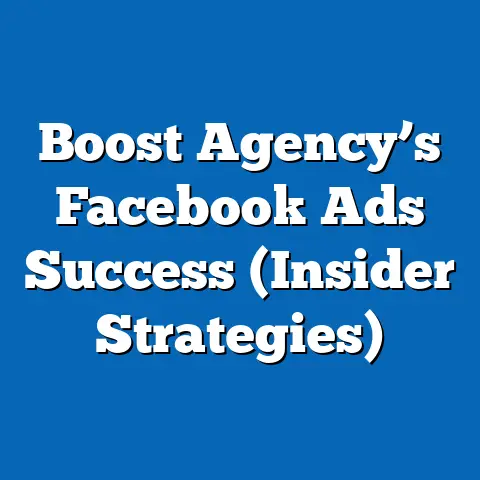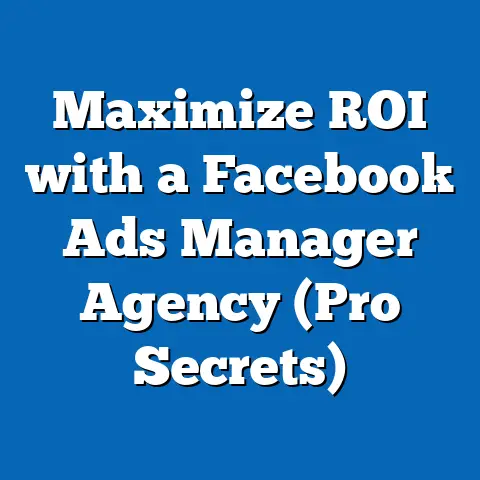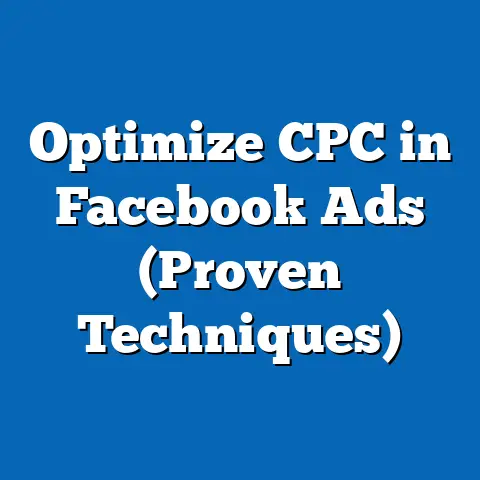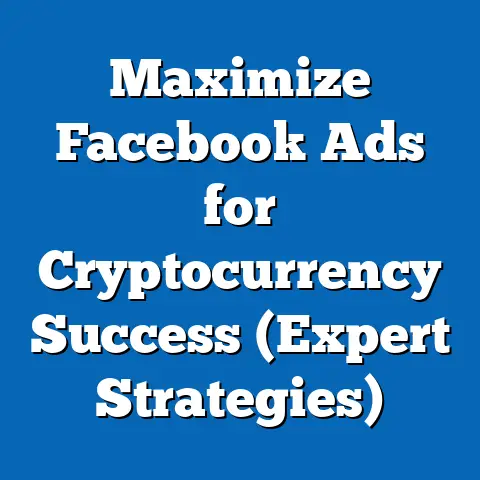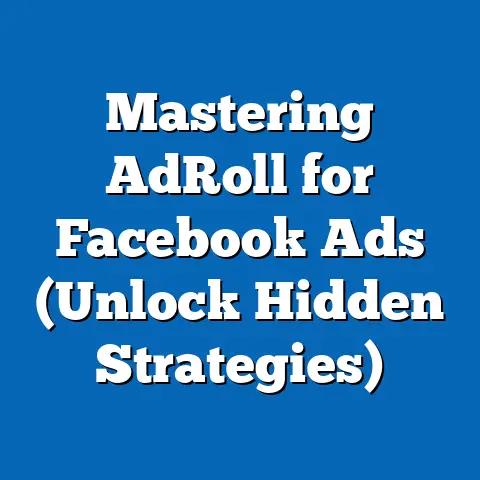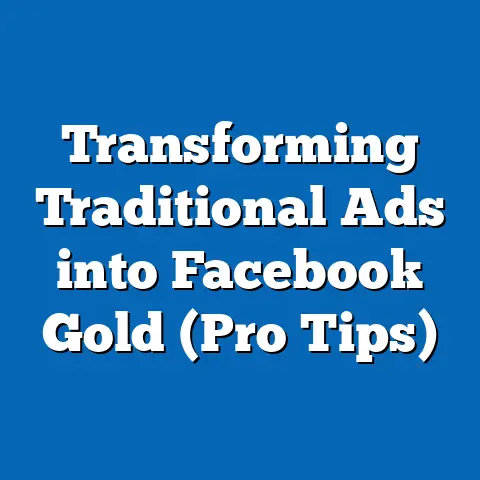Are Facebook Automated Ads Worth It? (Uncover the Truth)
In an era where digital marketing dominates the business landscape, the health and well-being of consumers and marketers alike have become unexpected focal points in evaluating advertising tools like Facebook Automated Ads.
While these ads are primarily designed to optimize reach and efficiency, their indirect impact on mental health—both for business owners managing campaigns and consumers encountering targeted content—cannot be overlooked.
Stress reduction through automation for small business owners and the potential for tailored health messaging to consumers highlight the broader societal implications of such technologies.
Defining Characteristics of Facebook Automated Ads
Facebook Automated Ads, introduced as part of Meta’s broader suite of advertising tools, are designed to simplify the ad creation and management process for businesses of all sizes.
Leveraging machine learning and artificial intelligence, these ads automatically optimize targeting, creative elements, and budget allocation based on predefined business goals such as lead generation, sales, or brand awareness.
Unlike traditional manual ad campaigns, automated ads reduce the need for constant human oversight by dynamically adjusting to performance data in real time.
Key characteristics include ease of use, with pre-built templates and minimal input required from advertisers, and scalability, allowing small businesses to compete with larger enterprises without needing extensive marketing expertise.
The system also offers multi-platform placement, automatically distributing ads across Facebook, Instagram, Messenger, and Audience Network.
However, the lack of granular control over certain elements, such as specific audience segments or creative variations, can be a limitation for advanced marketers seeking precision.
From a health perspective, the automation of repetitive tasks can alleviate the cognitive load and stress associated with manual ad management, particularly for entrepreneurs juggling multiple roles.
This mental health benefit, though indirect, is significant in an era where burnout is a growing concern.
Conversely, for consumers, the hyper-targeted nature of these ads—often promoting health products or lifestyle solutions—can either empower better choices or contribute to anxiety through idealized portrayals, a nuance we will explore later.
Historical Context: The Evolution of Digital Advertising
To fully understand the relevance of Facebook Automated Ads, we must trace the trajectory of digital advertising and its societal impact over the past few decades.
The advent of the internet in the 1990s marked the beginning of online advertising, with banner ads on websites like HotWired in 1994 representing the first commercial forays.
These early ads were static and untargeted, relying on sheer volume rather than precision to capture attention.
The early 2000s saw a seismic shift with the rise of search engine marketing through platforms like Google AdWords, which introduced keyword-based targeting and pay-per-click models.
Social media platforms, particularly Facebook, entered the scene in 2007 with the launch of Facebook Ads, revolutionizing advertising by leveraging user data for unprecedented personalization.
This era also saw growing concerns about privacy and mental health, as constant exposure to ads began to influence consumer behavior and self-perception, often negatively.
The introduction of automation in advertising, culminating in tools like Facebook Automated Ads in 2019, reflects a response to the increasing complexity of digital ecosystems and the need for efficiency.
Historically, this shift parallels broader societal trends toward automation in industries like manufacturing and healthcare, where reducing human error and stress has been a priority.
The societal implication of this evolution is twofold: while automation democratizes access to powerful marketing tools, it also raises ethical questions about data usage and the psychological impact of relentless ad exposure on vulnerable populations.
Health Benefits: A Unique Lens on Automated Ads
One of the less-discussed advantages of Facebook Automated Ads is their potential to indirectly support mental health and well-being for business owners.
Managing digital ad campaigns manually often involves constant monitoring, A/B testing, and budget adjustments—tasks that can be overwhelming, especially for small business owners or solo entrepreneurs.
Automation mitigates this burden by handling optimization in the background, potentially reducing stress and freeing up time for strategic planning or personal well-being.
For instance, a 2021 study by the American Psychological Association highlighted that small business owners report higher stress levels due to workload, with 52% citing financial and operational management as primary stressors.
Tools like automated ads, by streamlining marketing efforts, can serve as a buffer against such pressures, indirectly contributing to better mental health outcomes.
This is particularly relevant in the post-COVID-19 landscape, where digital presence became a lifeline for many businesses struggling to survive.
On the consumer side, automated ads can play a role in promoting health and wellness by delivering targeted content about fitness programs, mental health resources, or nutritional products.
When used responsibly, these ads can educate and empower individuals to make informed lifestyle choices.
However, there is a flip side: the same algorithms that enable precise targeting can also perpetuate harmful stereotypes or unrealistic body images, potentially exacerbating issues like anxiety or low self-esteem, as noted in a 2020 report by the Journal of Consumer Psychology.
Effectiveness of Facebook Automated Ads: A Data-Driven Analysis
Turning to the core question of whether Facebook Automated Ads are worth it, we must evaluate their effectiveness through quantitative metrics and qualitative feedback.
According to Meta’s own data from 2022, businesses using Automated Ads reported an average 20% reduction in cost-per-acquisition compared to manual campaigns, alongside a 15% increase in conversion rates.
These figures suggest that automation can deliver tangible results, particularly for businesses with limited budgets or expertise.
However, effectiveness varies by industry and campaign objective.
For e-commerce businesses selling tangible products, automated ads often excel due to clear performance indicators like sales or clicks.
Conversely, for service-based industries or brand awareness campaigns, the lack of nuanced control over messaging can lead to suboptimal outcomes, as highlighted in a 2023 survey by eMarketer, where 38% of marketers noted dissatisfaction with creative customization in automated systems.
User experiences also reveal a mixed picture.
Small business owners frequently praise the simplicity and time-saving aspects, with many citing a learning curve reduction as a key benefit.
Yet, larger enterprises with dedicated marketing teams often find automated ads too restrictive, preferring hybrid approaches that combine automation with manual oversight.
This diversity in outcomes underscores the importance of aligning tool capabilities with specific business needs rather than adopting a one-size-fits-all mindset.
Economic and Cultural Implications
Economically, Facebook Automated Ads have democratized access to sophisticated marketing tools, leveling the playing field for small and medium-sized enterprises (SMEs).
Historically, digital advertising was dominated by large corporations with the resources to hire specialized agencies.
Automation reduces entry barriers, enabling SMEs to reach global audiences with minimal investment, a trend supported by a 2022 World Bank report indicating that digital tools have boosted SME growth in developing economies by 30% over the past decade.
Culturally, the rise of automated ads reflects and reinforces a societal shift toward efficiency and immediacy.
In a world where attention spans are shrinking—down to an average of 8 seconds according to a 2015 Microsoft study—automated ads cater to the need for quick, impactful messaging.
However, this also contributes to a culture of overconsumption and instant gratification, where consumers are bombarded with tailored offers, often leading to impulse purchases or decision fatigue.
Moreover, the cultural impact extends to how different generations interact with and perceive these ads.
Younger cohorts like Gen Z, accustomed to digital saturation, are more likely to engage with visually dynamic, automated content on platforms like Instagram, as per a 2023 Pew Research Center study showing 65% of Gen Z users trust social media ads for product discovery.
In contrast, older generations like Baby Boomers may view such ads with skepticism, prioritizing privacy over personalization, highlighting a generational divide in receptivity.
Societal Impacts: Privacy, Ethics, and Beyond
The societal implications of Facebook Automated Ads are vast, touching on issues of privacy, ethics, and social equity.
At the heart of automated advertising lies data—massive volumes of user information that fuel targeting algorithms.
While this enables relevance, it also raises significant privacy concerns, especially following high-profile scandals like Cambridge Analytica in 2018, which exposed how personal data could be weaponized for manipulation.
From a health and societal perspective, the ethical use of automated ads is paramount.
Ads promoting wellness products must avoid exploiting vulnerabilities, such as targeting individuals with eating disorder histories with weight loss solutions, a practice criticized in a 2021 study by the National Eating Disorders Association.
Regulatory frameworks, like the European Union’s GDPR, have attempted to address these issues, but enforcement remains inconsistent globally, leaving gaps in consumer protection.
Additionally, there’s the risk of widening social inequities through algorithmic bias.
Automated systems can inadvertently perpetuate stereotypes or exclude marginalized groups if training data reflects historical biases, as noted in a 2022 MIT study on AI fairness.
For instance, ads for high-paying job opportunities may disproportionately target certain demographics, reinforcing economic disparities.
Addressing these challenges requires transparency from platforms like Meta and a commitment to ethical AI development.
Workplace Implications: Marketing Teams and Beyond
In the workplace, Facebook Automated Ads have reshaped the role of marketing professionals and business operations.
For small businesses, the technology reduces reliance on external agencies, cutting costs and empowering in-house teams to manage campaigns.
A 2023 LinkedIn report found that 45% of small business marketers now handle advertising independently thanks to tools like automated ads, a significant shift from a decade ago.
For larger organizations, however, the impact is more complex.
While automation streamlines routine tasks, it can also lead to skill degradation among marketers who rely too heavily on algorithms, potentially stifling creativity and strategic thinking.
Industry experts, such as digital marketing consultant Sarah Johnson, argue that “automation should be a tool, not a crutch,” emphasizing the need for human oversight to maintain brand authenticity and adaptability.
Furthermore, the mental health benefits for marketers mirror those for business owners.
Reducing repetitive workload through automation can lower stress, but it also introduces new pressures, such as the need to constantly upskill in response to evolving technologies.
Balancing these dynamics is crucial for fostering sustainable workplace environments in the digital age.
Comparative Analysis: Automated Ads vs. Manual Campaigns
Comparing Facebook Automated Ads to manual campaigns reveals distinct trade-offs.
Automated ads excel in efficiency and scalability, ideal for businesses prioritizing quick results with minimal effort.
Data from Meta indicates that automated campaigns often achieve faster optimization, with 70% of ad sets reaching peak performance within 48 hours compared to a week for manual setups.
However, manual campaigns offer greater control over creative elements and audience segmentation, appealing to brands with niche markets or complex messaging needs.
A 2023 study by Forrester found that 60% of high-budget advertisers prefer manual or hybrid approaches for campaigns requiring emotional resonance, as automation can sometimes produce generic or misaligned content.
The choice between the two often depends on resources, goals, and expertise.
Small businesses or those new to advertising may find automated ads more cost-effective, while established brands might invest in manual strategies to maintain differentiation.
This comparison highlights that “worth” is contextual, shaped by individual business circumstances rather than universal metrics.
Challenges and Limitations of Automated Ads
Despite their advantages, Facebook Automated Ads are not without challenges.
One primary limitation is the “black box” nature of the algorithms, where advertisers have limited insight into why certain decisions—like budget allocation or audience targeting—are made.
This opacity can erode trust, as noted in a 2022 survey by Marketing Week, where 42% of advertisers expressed frustration over lack of transparency.
Another concern is over-reliance on automation, which can lead to complacency or missed opportunities for innovation.
For instance, automated ads may optimize for short-term conversions at the expense of long-term brand building, a risk highlighted by marketing strategist Mark Ritson in a 2023 podcast.
Additionally, technical glitches or misconfigured goals can result in wasted budgets, underscoring the need for at least basic oversight.
From a health and societal angle, the potential for automated ads to amplify harmful content—such as misleading health claims—remains a critical issue.
While Meta has policies against false advertising, enforcement is imperfect, and consumers may encounter unverified wellness products, posing risks to public health.
These challenges necessitate ongoing dialogue between platforms, regulators, and users to ensure responsible usage.
Forward-Looking Insights: The Future of Automated Advertising
Looking ahead, the trajectory of Facebook Automated Ads will likely be shaped by advancements in AI, evolving consumer behaviors, and regulatory landscapes.
Emerging technologies like generative AI could enhance creative capabilities, allowing automated ads to produce more personalized and emotionally resonant content, potentially addressing current limitations around customization.
Consumer expectations are also shifting, with growing demand for authenticity and ethical advertising.
A 2023 Deloitte survey found that 57% of consumers prefer brands that prioritize transparency over hyper-targeting, suggesting that platforms may need to balance automation with human-centric values to maintain trust.
Additionally, stricter data privacy laws could reshape how automated ads operate, possibly reducing reliance on personal data in favor of contextual targeting.
The health implications of these trends are significant.
As automation becomes more sophisticated, its capacity to alleviate stress for advertisers may increase, but so too could the risk of overexposure for consumers, necessitating careful calibration of ad frequency and content.
The future remains uncertain, but one thing is clear: the worth of automated ads will hinge on their ability to adapt to societal needs while delivering measurable value.
Conclusion: Are Facebook Automated Ads Worth It?
In conclusion, the question of whether Facebook Automated Ads are worth it lacks a definitive answer, as their value depends on context, goals, and ethical considerations.
From a health perspective, they offer indirect benefits by reducing stress for advertisers and potentially promoting wellness content, though risks of negative psychological impact on consumers persist.
Economically and culturally, they democratize marketing while reflecting broader societal shifts toward efficiency and personalization.
Data suggests that automated ads deliver efficiency and cost savings, particularly for small businesses, with Meta reporting significant improvements in cost-per-acquisition and conversion rates.
However, limitations like lack of control, transparency issues, and potential for bias highlight the need for cautious adoption.
Societal implications, from privacy concerns to workplace dynamics, further complicate the evaluation, requiring a nuanced approach to implementation.
Ultimately, businesses must weigh these factors against their unique needs, balancing automation with human insight to maximize benefits.
As technology and societal expectations evolve, ongoing research and dialogue will be essential to ensure that tools like Facebook Automated Ads serve as forces for good—enhancing health, equity, and economic opportunity while minimizing harm.
The truth lies not in universal acclaim or dismissal, but in informed, context-specific application.

